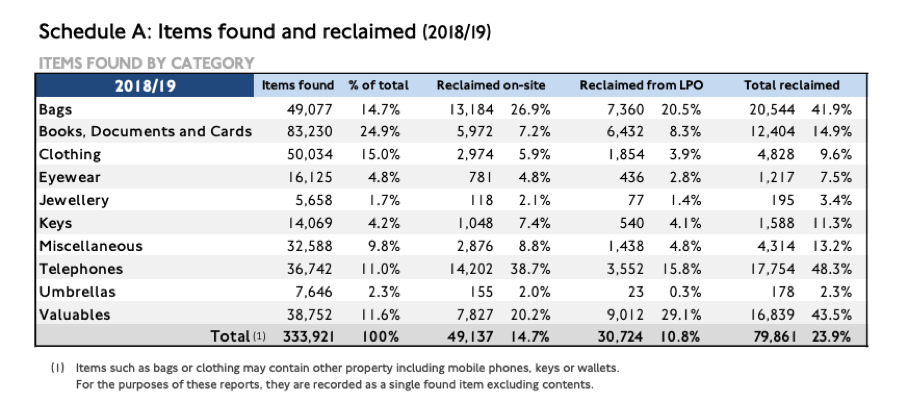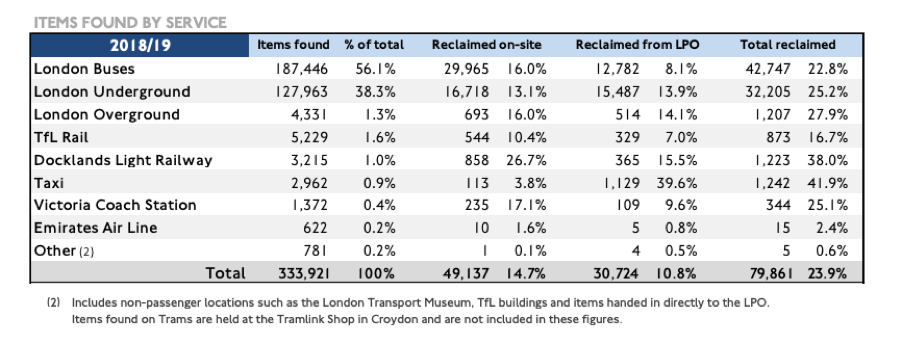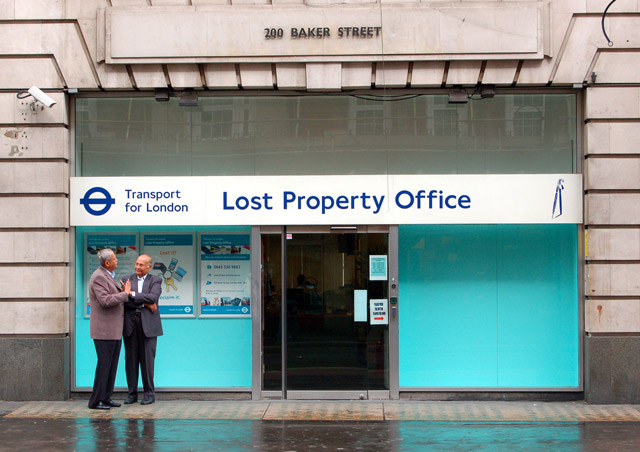Delve into how the famous TfL lost property office handles over 333,000 items of lost property every year
However, we’re in luck. Public transport systems, and all organisations, have a legal requirement to handle lost and found reasonably.
This means there is a trustworthy, hard-working team behind the scenes dedicated to getting lost items back to their owners.
What happens to lost items on public transport in London?
Over 3 million people use the trains, tubes, buses, trams and more in London every single day. It’s therefore unsurprising that around 1,100 items end up in the TfL Lost Property Office every single day. It’s the largest lost property office in the whole of Europe, receiving lost items from all public transport on the TfL network.
How much lost property does the TfL Lost Property Office get?
In the year 2018/19, over 333,000 items were found on public transport in London. The London lost property office commonly receives 300 bags and over 150 mobile phones through the door every day.
items were found on the TfL network in 2018/19


The large majority of items were lost on the buses (56.1%), followed by the underground (38.3%), with just shy of 24% of items being returned to owners.
That leaves the other 66% of lost property sat in the LPO unclaimed!
%
of items are never calimed
When is the London lost property transparency data published?
We would normally expect to see the newest annual Transport for London Lost Property Transparency data from TfL published around this time, detailing the amount and type of lost property handled during the past year.
However, due to disruptions as a result of COVID-19, we aren’t going to see this data yet.
Let’s take a deep dive into how one of the most developed transport systems in the world currently manage their lost and found.
What is the current process?
If you’ve lost an item on London public transport, this webpage has all the answers.
It’s important to note that enquiring about an item lost on a bus in the past 3 days is different! Here’s how to get in touch with the different bus companies. Plus, singular credit cards, debit cards, photocards or Oyster cards are destroyed immediately and not registered.
For all other lost items, simply fill in this online lost report form with as much detail as you can > Online enquiry form
Then, simply wait for an email response back.
Top tip: don’t get in touch with the lost property team via phone or email after you’ve submitted an enquiry. Try and be patient, there’s a lot of lost property to get through…
What does the TfL lost property office look like?
For a further look into the hordes of lost property, Paul Cowan, TfL Lost Property Office Manager, takes us through the process in this informative video: https://www.youtube.com/watch?v=mf5_r8xFTBo
What happens if the lost property office has my item?
If your item is found and a match has been made, you have 2 weeks to pick up your item. This can be done in person from the TfL lost property office which now sits on an even bigger plot in Pelham Street, South Kensington – recently moving from its iconic Baker Street address.
The new address of the TfL Lost Property Office is:
63-81 Pelham St, London SW7 2NJ
The closest Tube station: South Kensington
Alternatively, you can arrange them to send your item back to you for a small fee. Read more about the benefits of posting items in our latest blog.
What happens to TfL lost property if it is unclaimed?
The majority of items are kept for 3 months, after which ownership is transferred over to TfL. All personal or sensitive data on items (such as phones or cameras) is removed and securely destroyed.
Items are then either donated to charity, recycled, disposed of or anonymously sold at various auctions. All money gained gets fed back into the lost property process, covering labour and handling costs.
Did you know that during 2017-18, the most expensive items TfL sold were a brand-new Apple MacBook Pro, which went for £1,098, and a women’s Chanel leather handbag, which went for £998.
Could the lost property process be improved?
It’s brilliant to see TfL approaching the problem with lost property head on, covering so many different modes of transport.
Most notably, utilising a digital lost property system, rather than relying on paper forms, allows customer to enquire easily, taking pressure off of call centres and stopping physical visits from members of the public. This is particularly important during this time of COVID-19 whereby the contactless approach is favoured to limit risk of transmission. Read more about how to handle lost property safely during COVID-19.
However, it could be due a technological upgrade. A newer, improved system could encourage automatic matching behind the scenes, allowing staff to cut down on the time spent handling lost property.
Plus, it has been reported that it costs approximately £100 to return an item back to owner (Source: The Guardian) This encompasses everything from labour costs to postage and packaging. Could this number be significantly reduced with improvements to certain parts of the process?
In summary
Transport for London should be proud to be tackling lost property successfully as many other transport operators fail to hit the mark, risking poor passenger experience and negative reviews. However, there are indeed areas for improvement when it comes to cost, operational efficiency and using the most up-to-date technology. We’re excited to see how the lost property process develops in Europe’s largest lost property office over the next few years.
Interested in learning more about how transport operators could improve their lost property process? Get in touch with us on +44(0)20 8037 3970 or drop us an email !
Plus, follow us on LinkedIn and Twitter to stay up to date with all things lost property!
